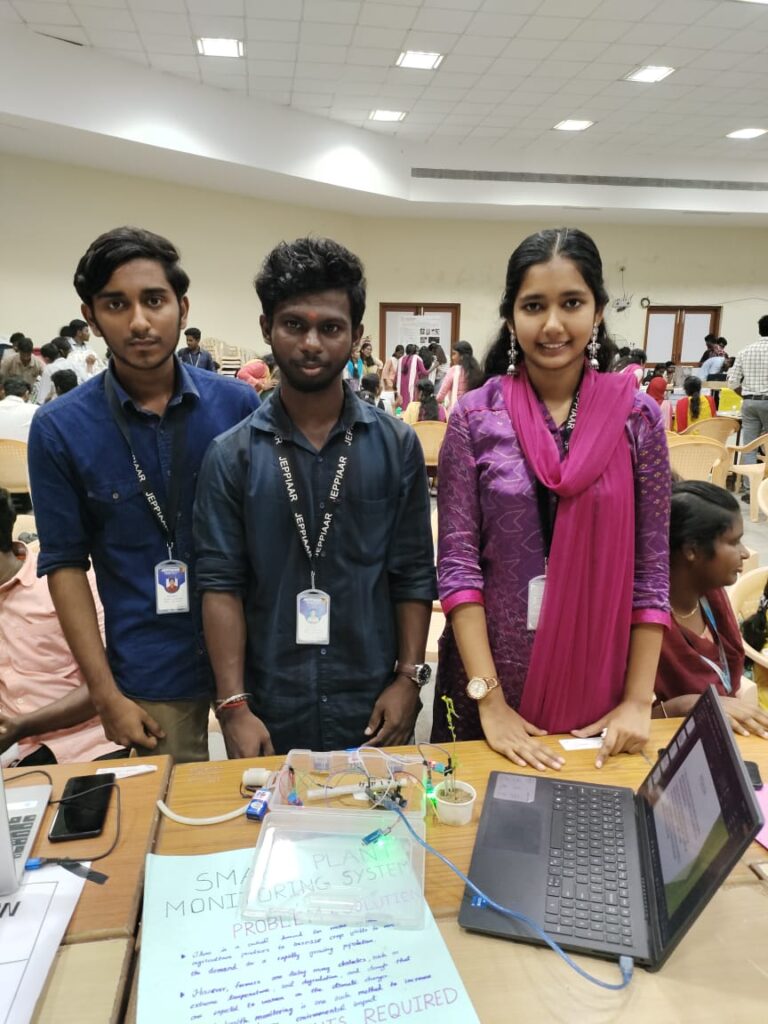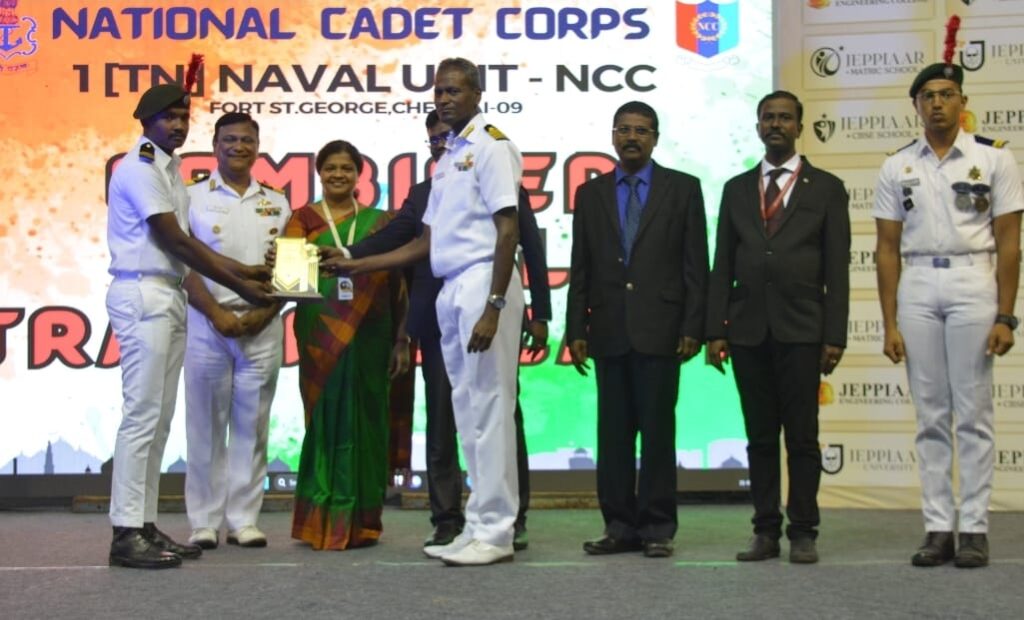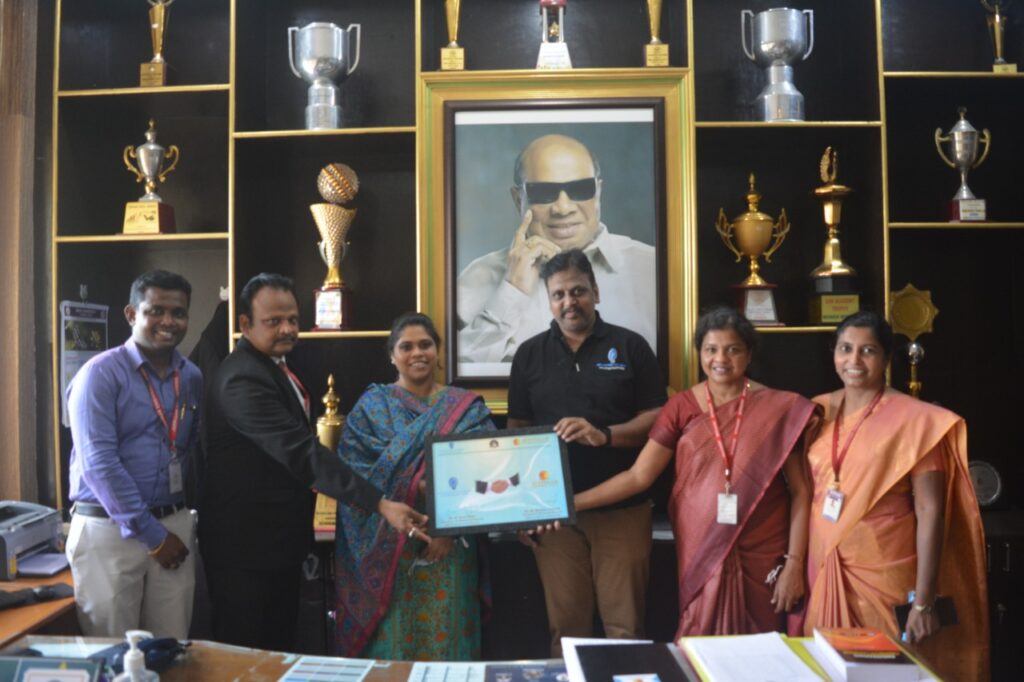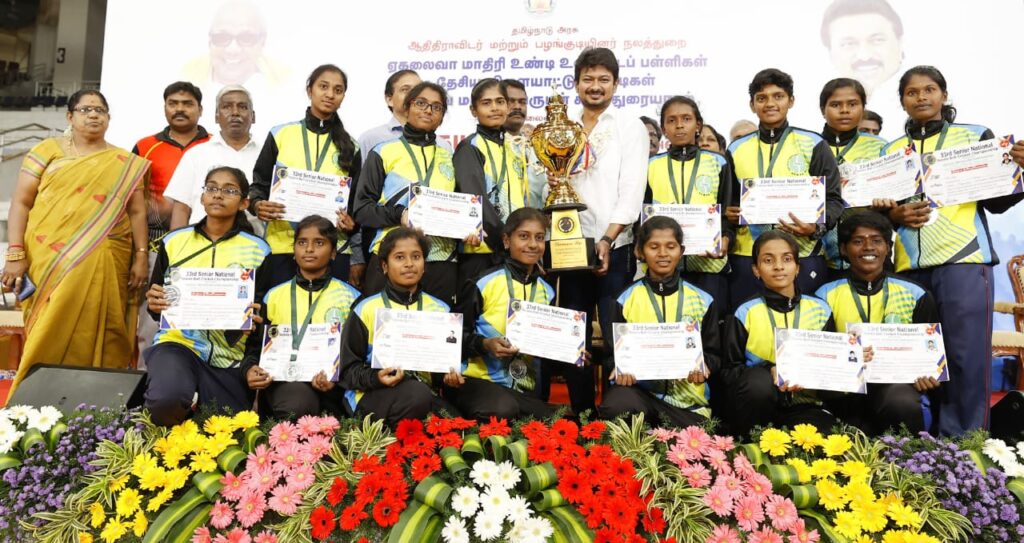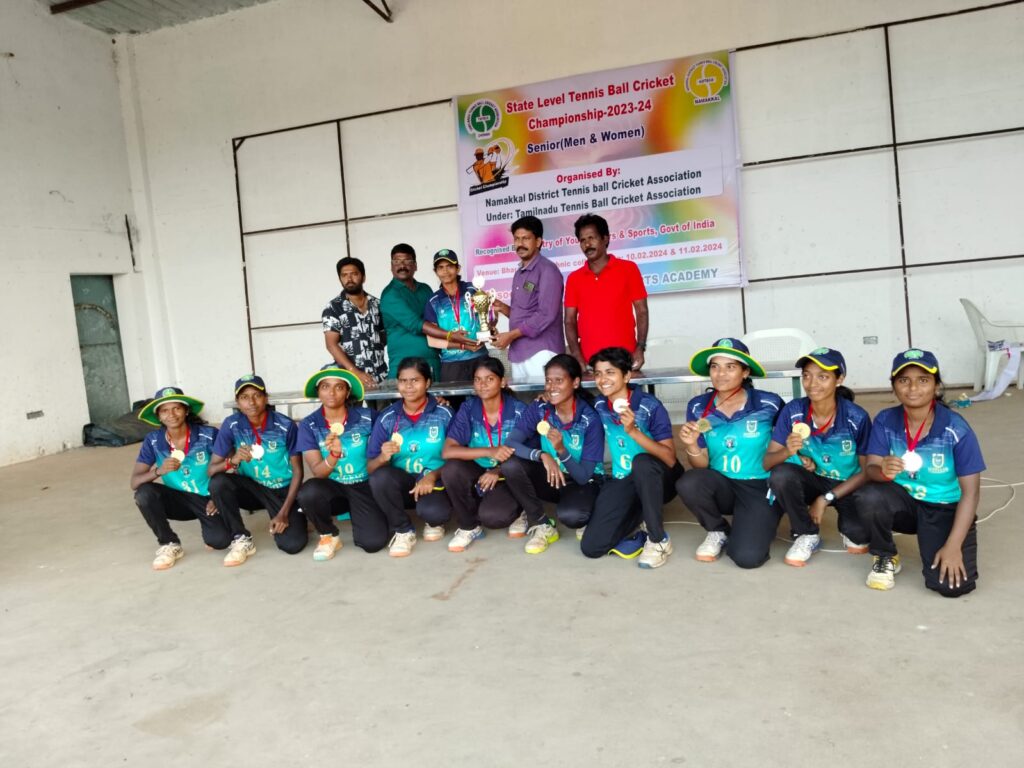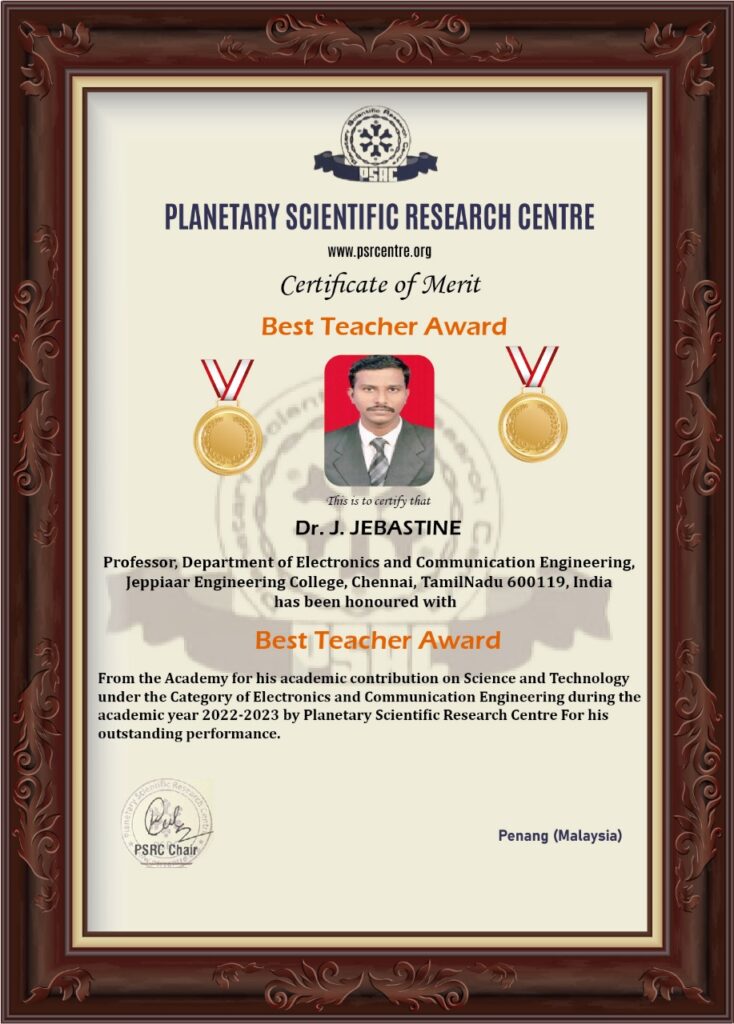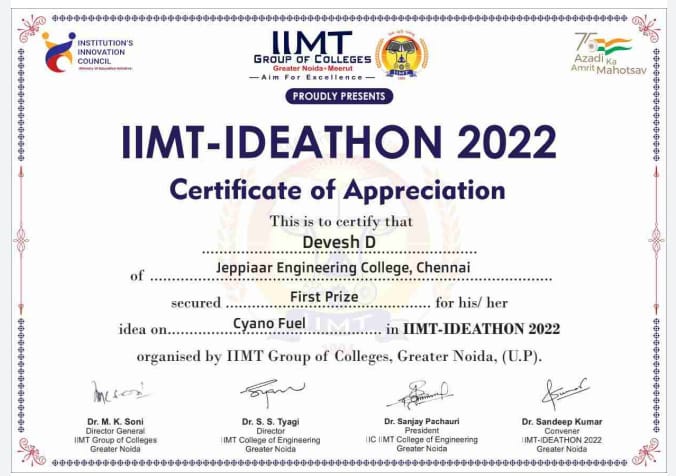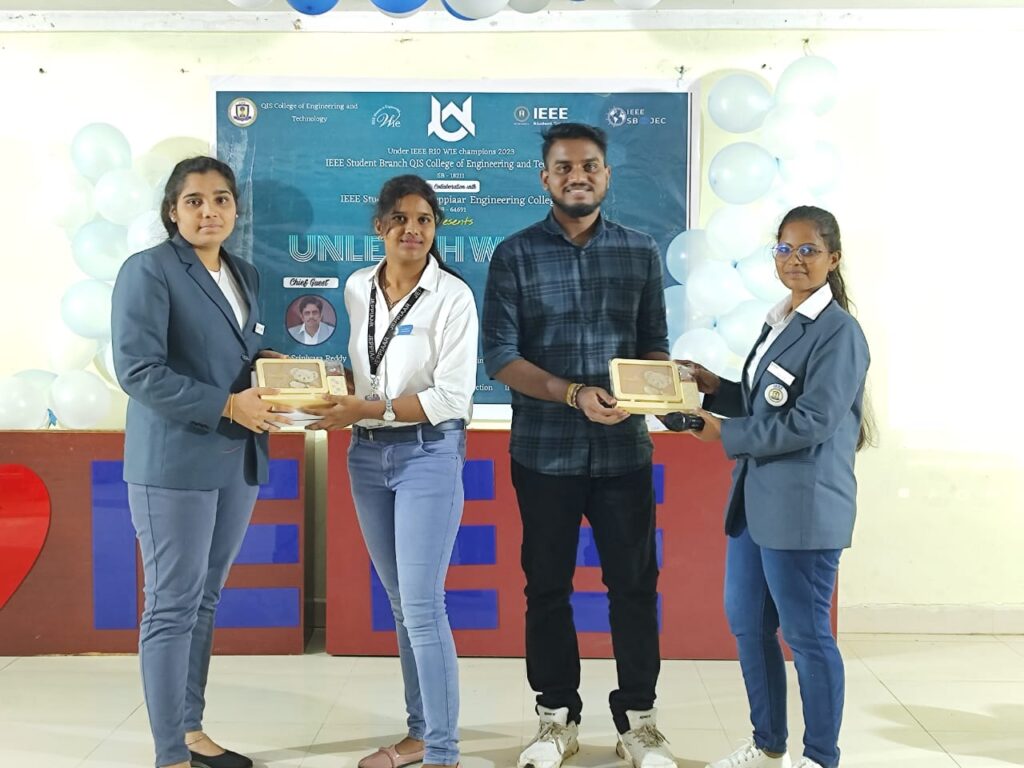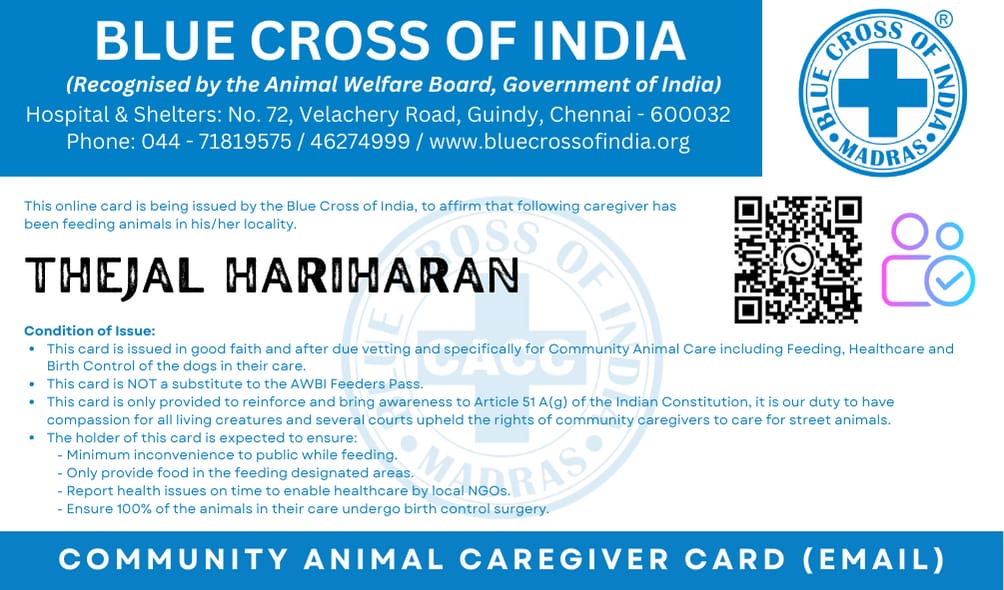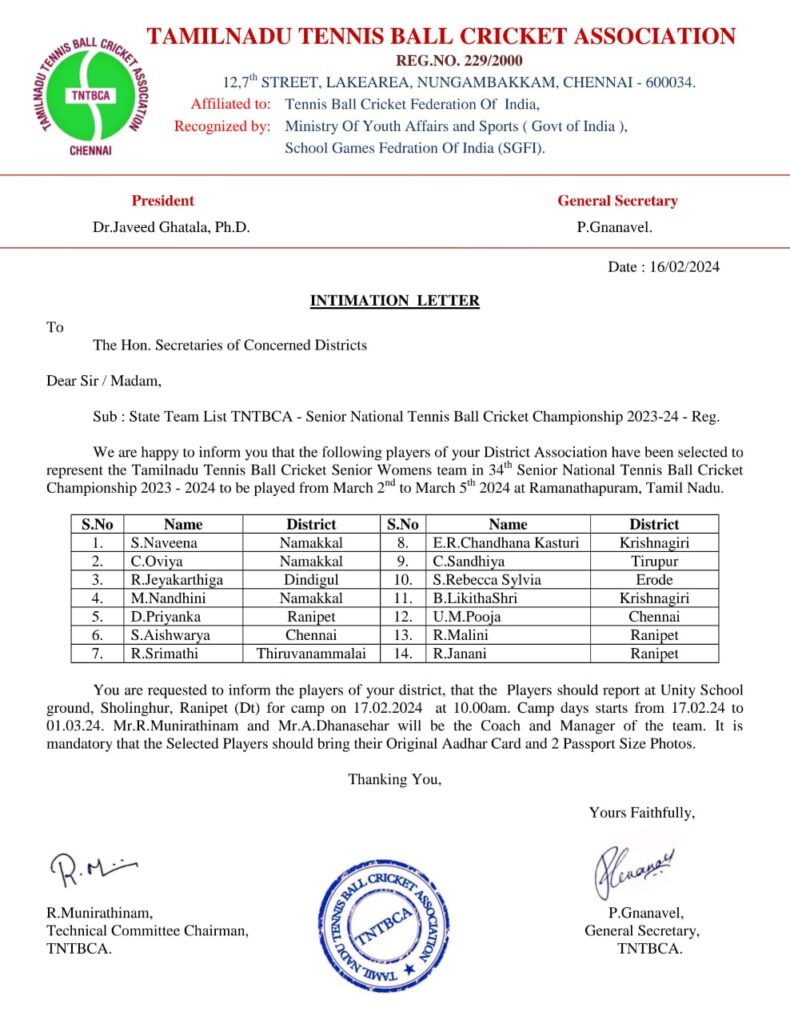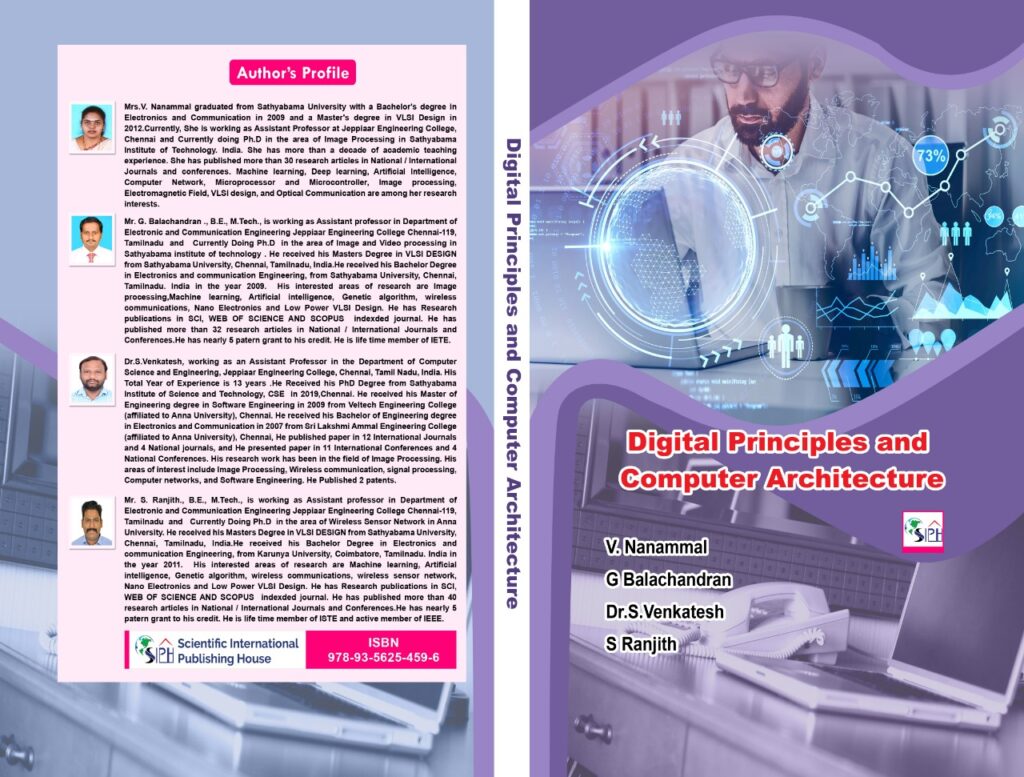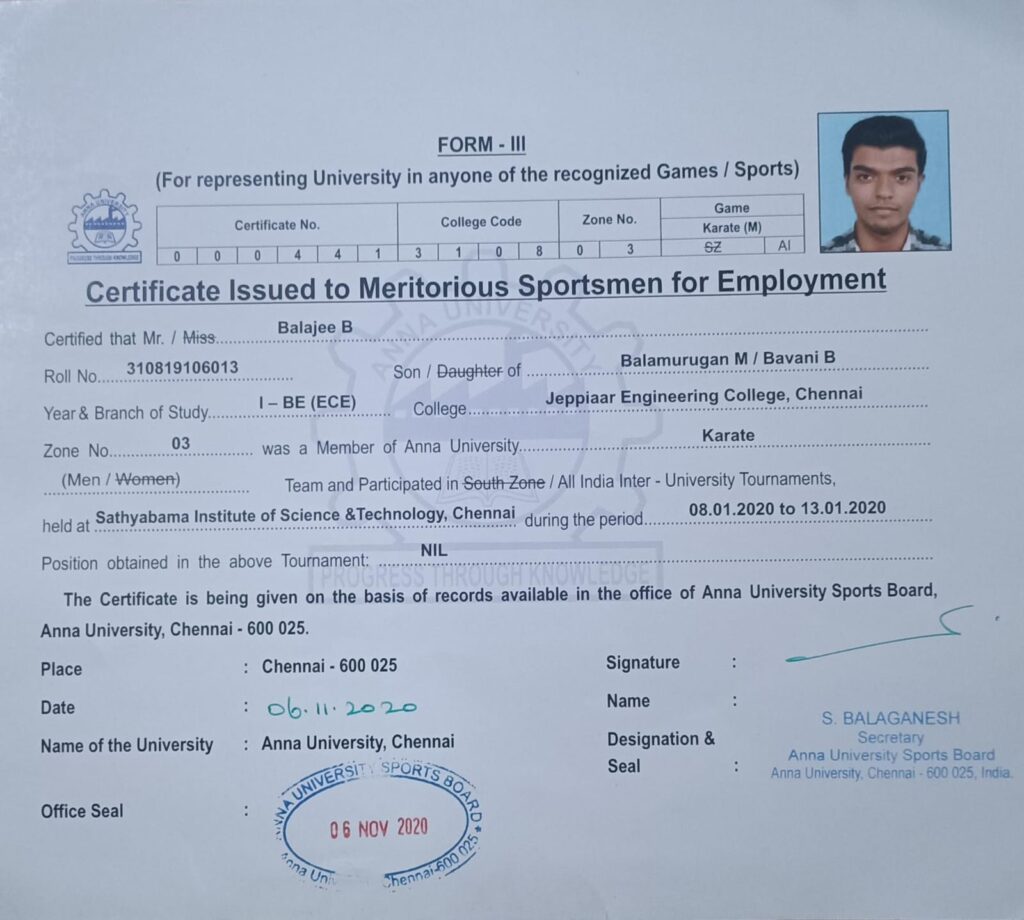DEPARTMENT OF ELECTRONICS AND COMMUNICATION ENGINEERING
About the Department
The Department of Electronics and Communication Engineering was established in the year 2001 with the vision to become a center of excellence to provide quality education and produce innovative engineers to excel at International level.
The Department Laboratories are fully air conditioned and well equipped with highly configured systems. The Department has well experienced and competent faculty in all specializations such as VLSI design, Applied Electronics, Microwave and Optical Engineering Communication Systems, Medical Electronics, Digital Systems, Embedded systems & IoT, Artificial Intelligence and Machine Learning. Colonel Dr.JEPPIAAR CENTRE FOR KNOWLEDGE SHARING is collaborated with NIELIT, ABE Semiconductor & Prag Robotics, Chennai accompanied by fully equipped Laboratory center along with required Hardware and Software tools.
The Department has signed MOU’s with Government sector and Private sectors such as NIELIT-Chennai, BSNL –Chennai, Vi Micro Systems Pvt. Ltd., ABE Semiconductor & Prag Robotics – Chennai for training both the Faculty and students to provide joint venture programs, project work, problems solving and Research & Development. Promotion of Academic – Industry interaction and English Language proficiency training is provided to the students.
The Department has also initiated two professional societies namely, IEEE Communication Society, IEEE Signal Processing Society and IETE society. The department organizes various training programs with renowned expert trainers from different enterprises and global organizations to improve the verbal and aptitude skills of students so as to be easily hired by leading core and IT industries. The Department exceeds expectations with an outcome of 90% of students getting placed in various top companies like Robert Bosch, Mazenet Solutions, ADR Techno Solutions, Imperium, MTI Instruments, Infosys, Wipro, Cognizant, Capegemini, CSC, NTT Data, MINDTREE, L&T InfoTech, Excela.com and so on. The undergraduates from this department have become professional engineers, employed both in core and software companies.As part of research, Under-Graduate students are encouraged to carry out their project in recent research fields across various areas of Electronics and Communication.Students pursue higher studies in leading universities abroad. The department secured Anna University Gold Medal during the year 2006, 2013, 2019 respectively. The department procures more University ranks every year. The students of ECE Department have participated in “The Smart India Hackathon 2017, 2019 and 2022” where government departments were directly engaging with students and challenging them to build digital solutions to improve their efficiency, plug revenue leakages and corruption.
Our faculty members have received honors and awards for exceptional services in scholastics and research. The department faculty has filed patents to safeguard their new inventions. They attend FDPs/workshops consistently to improve their technical knowledge and research skills.
Programmes offered by the Department are:
- B.E. ELECTRONICS AND COMMUNICATION ENGINEERING [4 – YEARS]
VISION OF THE DEPARTMENT
To become a center of excellence to provide quality education and produce creative engineers in the field of Electronics and Communication Engineering to excel at international level.
MISSION OF THE DEPARTMENT
| M1 | Inculcate creative thinking and zeal for research to excel in teaching-learning process. |
| M2 | Create and disseminate technical knowledge in collaboration with industries. |
| M3 | Provide ethical and value based education by promoting activities for the betterment of the society. |
| M4 | Encourage higher studies, employability skills, entrepreneurship and research to produce efficient professionals thereby adding value to the nation’s economy. |
PROGRAMME OUTCOMES
| PO1 | Engineering Knowledge: Apply the Knowledge of mathematics, science, engineering fundamentals, and an engineering specialization to the solution of complex engineering problems. |
| PO2 | Problem analysis: Identify, formulate, review research literature, and analyze complex engineering problems reaching substantiated conclusions using first principles of mathematics, natural sciences, and engineering sciences. |
| PO3 | Design/development of solutions: Design solutions for complex engineering problems and design system components or processes that meet the specified needs with appropriate consideration for the public health and safety, and the cultural, societal, and environmental considerations. |
| PO4 | Conduct investigations of complex problems: Use research-based knowledge and research methods including design of experiments, analysis and interpretation of data, and synthesis of the information to provide valid conclusions. |
| PO5 | Modern tool usage: Create, select, and apply appropriate techniques, resources, and modern engineering and IT tools including prediction and modeling to complex engineering activities with an understanding of the limitations. |
| PO6 | The engineer and society: Apply reasoning informed by the contextual knowledge to assess societal, health, safety, legal and cultural issues and the consequent responsibilities relevant to the professional engineering practice. |
| PO7 | Environment and sustainability: Understand the impact of the professional engineering solutions in societal and environmental contexts, and demonstrate the knowledge of, and need for sustainable development. |
| PO8 | Ethics: Apply ethical principles and commit to professional ethics and responsibilities and norms of the engineering practice. |
| PO9 | Individual and team work: Function effectively as an individual, and as a member or leader in diverse teams, and in multidisciplinary settings. |
| PO10 | Communication: Communicate effectively on complex engineering activities with the engineering community and with society at large, such as, being able to comprehend and write effective reports and design documentation, make effective presentations, and give and receive clear instructions. |
| PO11 | Project management and finance: Demonstrate knowledge and understanding of the engineering and management principles and apply these to one’s own work, as a member and leader in a team, to manage projects and in multidisciplinary environments. |
| PO12 | Life-long learning: Recognize the need for, and have the preparation and ability to engage in independent and life-long learning in the broadest context of technological change. |
PEO’s of DEPARTMENT
| PEO No | Program Educational Objectives Statements |
| PEO1 | Produce technically competent graduates with a solid foundation in the field of Electronics and Communication Engineering with the ability to analyze, design, develop, and implement electronic systems. |
| PEO2 | Motivate the students for choosing the successful career choices in both public and private sectors by imparting professional development activities |
| PEO3 | Inculcate the ethical values, effective communication skills and develop the ability to integrate engineering skills to broader social needs to the students. |
| PEO4 | Impart professional competence, desire for lifelong learning and leadership skills in the field of Electronics and Communication Engineering. |
PSO’s of DEPARTMENT
| Program Specific Outcomes | After the successful completion of B.E Programme in Electronics and Communication Engineering, the graduates will be able to |
| PSO1 | Design, develop and analyze electronic systems through application of relevant electronics, mathematics and engineering principles |
| PSO2 | Design, develop and analyze communication systems through application of fundamentals from communication principles, signal processing, and RF System Design & Electromagnetics. |
| PSO3 | Adapt to emerging electronics and communication technologies and develop innovative solutions for existing and newer problems |
Click the below link to download the regulation.
B.E. ECE
B.E.ECE 2021 Regulation syllabus
B.E ECE 2017 Regulation syllabus
B.E. ECE 2013 Regulation syllabus
B.E. ECE 2008 Regulation syllabus
M.E. VLSI DESIGN
M.E. VLSI 2021 regulation syllabus
M.E. VLSI 2017 regulation syllabus
INFRASTRUCTURE
Laboratories |
| 1. Circuit Analysis Laboratory |
| 2. Electronic Devices And Circuits Laboratory |
| 3. Communication Systems Laboratory |
| 4. Linear Integrated Circuits Laboratory |
| 5. VLSI Laboratory |
INNOVATIVE TEACHING
Innovations by the Faculty in Teaching and Learning
Class Room Lectures: Lectures are a traditional but essential teaching method. Instructors can deliver key concepts, theories, and explanations in a structured manner. However, it’s important to make lectures engaging by using multimedia presentations, real-world examples, and interactive discussions.
Outcomes:
- Impart Fundamental Knowledge
- Improve Communication and Listening Skills
- Promote Discipline and Time Management
Laboratory Work: Hands-on laboratory experiments are crucial for engineering students to apply theoretical knowledge to practical situations.
Outcomes:
- Develop Practical Skills
- Strengthen Data Analysis and Interpretation
- Bridge Gap Between Theory and Industry Application
Problem-Based Learning (PBL): PBL involves presenting students with real-world engineering problems and challenges. They work in small groups to research, analyze, and propose solutions.
Outcomes:
- Develop Critical Thinking and Analytical Skills
- Promote Self-Directed Learning
- Strengthen Research and Inquiry Abilities
Project-Based Learning (PjBL): In PjBL, students work on long-term engineering projects that mimic real-world scenarios. They apply their knowledge to design, build, and test solutions.
Outcomes:
- Develop Critical Thinking and Analytical Skills
- Promote Self-Directed Learning
- Strengthen Research and Inquiry Abilities
Collaborative Learning: Group work and peer-to-peer teaching can be effective in engineering education. Students can collaborate on projects, discuss concepts, and teach each other. This promotes teamwork, communication, and the sharing of diverse perspectives.
Outcomes:
- Develop Critical Thinking and Analytical Skills
- Promote Self-Directed Learning
- Strengthen Research and Inquiry Abilities
Simulation and Modeling: Using computer simulations and modeling tools can help students visualize complex engineering systems and gain practical experience in a controlled environment.
Outcomes:
- Hands-on Experience with Tools
- Bridge Between Theory and Practice
Guest Lectures and Industry Experts: Inviting guest speakers from industry can provide valuable insights and real-world context to engineering concepts. It also helps students understand the relevance of what they are learning.
Outcomes:
- Exposure to Industry Trends and Technologies
Online Resources: Utilize online platforms, forums, and resources for supplementary learning. Many engineering courses benefit from online tutorials, forums for discussion, and access to open educational resources (OERs).
2024-2025
2023-2024
2022-2023
2021-2022
FACULTY LIST
ECE FACULTY NAME LIST FOR THE PAST 5 YEARS
FACULTY LIST FOR ACADEMIC YEAR 2025-2026
PROFESSOR AND HEAD
PROFESSOR
Dr.G.C.JAGAN , M.E, Ph.D
ASSOCIATE PROFESSORS
Dr.T.R.CHENTHIL , M.E, Ph.D
Dr.G.BALACHANDRAN, M.Tech , Ph.D
Dr.V.NANAMMAL, M.Tech , Ph.D
Dr.K.BAGIRATHAN, M.E ,Ph.D
Dr.C.H.VENKATA SIVA PRASAD M.Tech,Ph.D
ASSISTANT PROFESSORS
Dr. S.RANJITH , M.Tech , Ph.D
Mrs.C. ANITHA , M.E,(Ph.D)
Mr. S. BENJAMIN ARUL, M.E,(Ph.D)
Mr. R. VIVEK KRISHNA, M.E,(Ph.D)
Mrs.R GRACELIN SHEEBA , M.E,(Ph.D)
Mr. E. SAKTHIVEL , M.E,(Ph.D)
Mr. S.K. SINU SIVA SINGH, M.E,(Ph.D)
Mr.C. JERLIN AJITH DAVID SON, M.E,(Ph.D)
Mrs.A. SAJITHA, M.E,(Ph.D)
Mr.B. APPOON, M.E,(Ph.D)
Mrs. K. NANSY, M.E,(Ph.D)
Mr.J. RANJITH KUMAR, M.E,(Ph.D)
Ms. M. JOSEPHINE MARY JULIANA, M.Tech , (Ph.D)
Dr.S. LINCY GOLDA CARELINE , M.E ,Ph.D
Ms.R. SHAAMILI , M.Tech , (Ph.D)
Mrs.V.D DEEPIKA, M.E
Mrs.K. PRAVEELA , M.E,(Ph.D)
Mrs.F. DALPHIN MARY, M.E., (Ph.D)
Mr.M. SINUVASAN , M.Tech
Mrs.S. THILLAIYARASI , M.E
PUBLICATIONS
FACULTY
National and International Journals
Journal Publication 2024-2025
Journal Publication 2023-2024
Journal Publication 2022-2023
Journal Publlication 2021-2022
Conference publication
Conference Publication 2024-2025
Conference Publication 2023-2024
Conference Publication 2022-2023
Conference Publication 2021-2022
Student Publication
Student publication 2023-2024
Student Publication 2022-2023
Student Publication 2021-2022
Student Publication 2020-2021
SECOND YEAR
EC3353 ELECTRONIC DEVICES AND CIRCUITS
EC3451 – LINEAR INTEGRATED CIRCUITS
THIRD YEAR
CEC345 OPTICAL COMMUNICATION & NETWORKS
CEC352 SATELLITE COMMUNICATION
CEC360 UNDERWATER NAVIGATION SYSTEM
CS3491 ARTIFICIAL INTELLIGENCE AND MACHINE LEARNING
EC3351 TRANSMISSION LINE AND RF SYSTEM
ECC3501 WIRELESS COMMUNICATION
ET3491 EMBEDDED SYSTEMS AND IOT DESIGN
LAB MANUAL
EC3271 CIRCUIT ANALYSIS LABORRATORY
EC3361- ELECTRONICS DEVICES LABORATORY
EC3461-COMMUNICATION SYSTEMS LABORATORY
DEPARTMENT ACHIEVEMENTS
DEPARTMENT ACHIEVEMENTS
- Three Students achieved Gold Medals in their Undergraduate Programme.
- 67 Students attained Anna University Rank.
- The Best Department Award was received from Staffordshire University, UK in 2019.
- Out of 27 Faculty members, 9 are D holders and 15 are pursing Ph.D.
- Received 7 Indian Design Patent Grant and 2 UK Design Patent.
- Received one Lakh Grant for AICTE Sponsored ATAL FDP Programme
- Received 2 Projects Grant from TamilNadu State Council For Science And Technology (TNSCST) Under Student Project Scheme.
FACULTY ACHIEVEMENTS/RECOGNITION
- J. Jebastine received the PILOT Award from IEEE YESIST’12 in 2023 at the Grand Finale held at the Arab Academy for Science, Technology and Maritime Transport, Egypt.
- J. Jebastine was honored with the Student Branch Award from IEEE Madras Section for the year 2024, on February 23, 2024.
- G. Balachandran was honored for exceptional community service through the Youth Red Cross by the Directorate of Revenue Officer in 2023.
- V. Nanammal received the Best Performer Award 2025 at the Educators Conclave organized by ICT Academy.
- G. C. Jagan received the Best Paper Award at the IEEE Conference (ICPECS 2022) for the paper “Heptagonal Fractal Antenna with Slit for Improved Efficiency.”
- B. Arun Vijayakumar and Mr. S. Ranjith were honored by the Mayor of Chennai and officials for the college’s NSS recognition.
- C. Anitha was awarded a Certificate of Appreciation by Texas Instruments for mentoring students and bridging the industry-academia gap.
- T. R. Centhil was recognized for his review contributions to the Elsevier Journal.
- R. GracelinSheeba successfully completed the Swayam NPTEL Domain Certification in Data Science.
- J. Jebastine was awarded a Certificate of Merit by the Planetary Scientific Research Centre, Malaysia, for being the Best Teacher.
- Digital Principles and Computer Architecture was authored by ECE faculty members V. Nanammal, Mr. R. Ranjith, and Dr. G. Balachandran.
- VLSI and Chip Design was authored by ECE faculty members R. Ranjith, Dr. G. Balachandran, Mr. T. R. Centhil, and Mr. E. Sakthivel.
ACHIEVEMENTS OF STUDENTS
- Yasmeen Begum D won First Place and Mr.Mukesh U won Second Place in India’ s Young Scientist at Youth United Festival were honored by Former Governor of Telegana Dr. TamilisaiSoundararajan.
- Kiran P won First Place in Paper Presentation Organized by IIT Madras with a cash Prize ₹ 8000/-.
- Dhivagar K V and Hariharan K of Final-year has developed Real-time Interactive Robot.
- BeemaDewan, Mr. Aravindh, and Mr. Naveen won First Prize in the Project Competition at Anand Institute of Technology.
- Kiran P,Managing Director and Co-founder of Neuro Stack ,a startupfor IT services with AI
- Kathiravan won the Bronze Medal in TABLE VAULT in the CM Trophy showcasing sports excellence.
- Srimathihas won First Placein State Level Tennis BallCricket match.
- Abhishek Bala NCCStudent was promoted to Senior Cadet Captain.
- Kosalraman, won the State-Level Kabaddi Competition exemplifying athletic achievement.
- Balajeehas Selected in Karate for All India University Karate Championship.
- Ganesh and Priyadharshini were awarded the IEEE Richard E. Merwin award, each receiving $1000.
.
Our Featured Images
UNIVERSITY RANK HOLDERS (B.E – ECE)
| BATCH | STUDENT NAME | CGPA | RANK |
| 2016-20 | HARSHINI. A | 9.04 | 21 |
| 2015-19 | PAVITHRA A | 9.02 | 23 |
| 2014-18 | ELIZABETH ABRAHAM | 9.06 | 16 |
| DHARANI. K | 9.04 | 18 | |
| VAISHNAVI. V | 9.00 | 22 | |
| ANGELINE KESHYA. D | 8.81 | 41 | |
| SOUNDHARYA. L | 8.79 | 43 | |
| REMILA DASLIN. M | 8.77 | 45 | |
| KAVIPRIYA. G | 8.75 | 47 | |
| 2013-17 | AGNES JENNEFER. J | 8.92 | 37 |
| 2012-16 | KANDASAMY SURYAPRAKASH. N | 9.05 | 24 |
| MONICA JAMIMA. A | 8.88 | 41 | |
| 2011-15 | AALIN SABATNI. V. A | 8.94 | 32 |
| 2010-14 | VENKAT BALAJI. A | 8.81 | 30 |
| ANUPAMA. K. S | 8.68 | 41 | |
| PADMINI. M | 8.60 | 49 | |
| 2009-13 | SHEEBA. S | 9.36 | 1 |
| VINODEEPHAN. R | 9.14 | 7 | |
| SHEEBA AGNES. S | 8.77 | 40 | |
| DEEPA JEBAMALAR. S | 8.75 | 42 | |
| BALASHREE. S | 8.75 | 42 | |
| REVATHY. R | 8.71 | 46 | |
| CHITRA. P | 8.69 | 48 | |
| VAISHALI. S | 8.67 | 50 | |
| 2008-12 | FARIDHA BEGUM. K | 9.03 | 13 |
| JANANI. V | 8.82 | 32 | |
| HINDHUJAA. J | 8.69 | 45 | |
| NIRANJANI. K | 8.69 | 45 | |
| ROHITH JAYADEV. S | 8.67 | 47 | |
| SRI VISHWAPRIYA. B | 8.67 | 47 | |
| RUBINI. U | 8.64 | 50 | |
| 2007-11 | BENISHA. M | 89% | 5 |
| SHYAMALADEVI. M | 87% | 31 | |
| PRIYADHARSHINI. A | 87% | 33 | |
| 2006-10 | LAAVANYA. S | 88% | 16 |
| NANCY PEARLINE. M | 87% | 32 | |
| DEEPIKA. P | 87% | 35 | |
| JAYACHANDRAN. S | 87% | 44 | |
| 2005-09 | CANDIDA JANE MARIA.U | 89% | 13 |
| ESTHER FLORENCE. S | 88% | 30 | |
| KIRUBA VENI. S | 87% | 44 | |
| 2004-08 | JAYASHREE. P | 88% | 29 |
| JENITA MERLIN | 87% | 39 | |
| 2003-07 | DIVYALAKSHMI. K | 89% | 12 |
| DIVYA. V | 88% | 33 | |
| MAJITHA. A | 87% | 44 | |
| 2002-06 | SWAPNA. A | 94% | 1 |
| LEO EBENEZER.V | 89% | 23 | |
| SOPHIA XAVIER | 88% | 26 |
UNIVERSITY RANK HOLDERS (M.E – VLSI DESIGN)
| BATCH | STUDENT NAME | CGPA | RANK | |
| 2017-2019 | KRIPA S | 9.23 | 1 | |
| 2015-2017 | DURGA. M | 8.97 | 6 | |
| DHIVYA BHARATHI.K | 8.91 | 10 | ||
| THILLAIYARASI. S | 8.74 | 19 | ||
| 2014-2016 | ABIRAMI.B. M | 9.01 | 5 | |
| PITCHAIKANI. A | 8.91 | 12 | ||
| CHRISTY HANCY RANI. V | 8.87 | 14 | ||
| KASTHURI. B | 8.87 | 14 | ||
| ANISHA. S. R | 8.81 | 18 | ||
| DALPHIN MARY. F | 8.79 | 19 | ||
| JEBA. R | 8.69 | 25 | ||
| YOGASRI. G. R | 8.53 | 36 | ||
Sponsored Research
| Academic Year | Project Title | Name of the Principal Investigator | Name of the funding agency | Amount (in lakh) | Status |
| 2024-2025 | ATAL FDP – Emerging Trends in AI and Future Applications | Dr.V.Nanammal , Dr.G.C.Jagan | ATAL AICTE | 100,000 | Completed |
| 2024-2025 | Design of a Smart safety Device for Women using IoT | Dr.J.Jebastine | TNSCST | 7,500 | 6Months |
| 2023-2024 | Safety Device for | Mr.E.Sakthivel | TNSCST | 7,500 | 6 Months |
| AI powered Eco smart waste and energy system | Mr.T.R.Chenthil | Non Government | 80,000.00 | 1 year | |
| 2022-2023 | Smart Dispenser and Incineration | Mrs.V.Nanammal | Non Government | 75,000.00 | 1 year |
| 2021-2022 | Automatic Seat belt | Mr.Arun Vijaya Kumar | Non Government | 75,000.00 | 1 year |
Consultancy
| Academic Year | Project Tittle | Duration | Amount |
| 2023-2024 | Surveillance Robot Using Raspberry PI and Night Vision Camera | 4 month | 50,000.00 |
| Forest Fire and Animal Detection Drone | 4 month | 45,000.00 | |
| 2022-2023 | Hybrid solar E bike | 3 month | 50,000.00 |
| Automated seed sowing Robot | 4 month | 50,000.00 | |
| 2021-2022 | Colorimetry | 4 month | 65,000.00 |
| Painting Robot | 4 month | 80,000.00 |
PATENT
ECE Faculty Patent Details
Patent Publication 2024-2025
Patent Publication 2023-2024
Patent Publication 2022-2023
Patent Publication 2021-2022
Ph.D Research
ECE Ph.D Details
Contact Details:
Dr. J.JEBASTINE., M.E, Ph.D
Professor & Head
DEPARTMENT OF ELECTRONICS AND COMMUNICATION ENGINEERING,
JEPPIAAR ENGINEERING COLLEGE,
JEPPIAAR NAGAR, RAJIV GANDHI SALAI, CHENNAI-119.
Phone no:
044 2450 2818
Email:
ece@jeppiaarcollege.org

